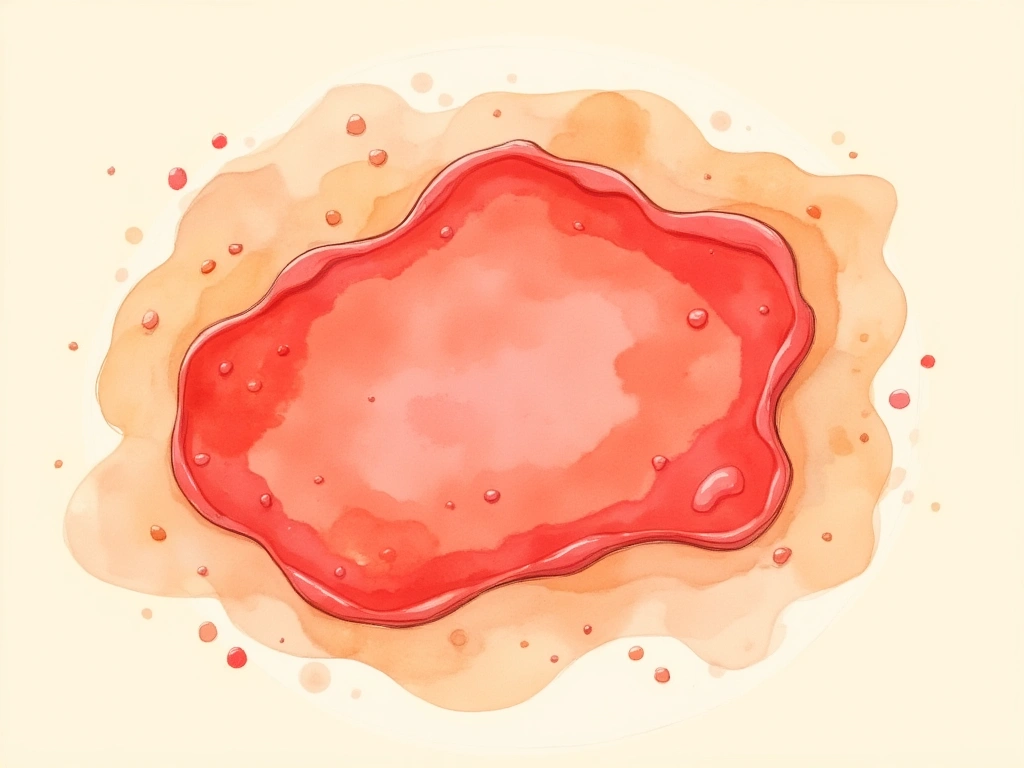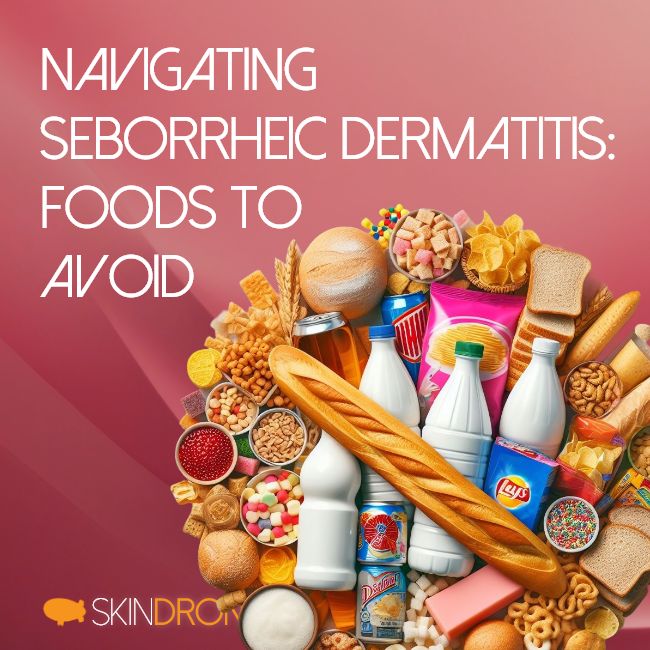- Diet and Seborrheic Dermatitis: Emerging research suggests a link between what you eat and seborrheic dermatitis flare-ups.
- Key Culprits: Certain foods like white bread, sugary cereals, and processed snacks may worsen symptoms.
- Inflammation Focus: Anti-inflammatory diets rich in fruits, vegetables, and healthy fats could offer a preventive approach.
- Gut-Skin Connection: The gut-skin axis is a promising area of research for managing skin conditions like seborrheic dermatitis.
- Holistic Management: Combine dietary changes with gentle skincare, stress management, and medical treatments for best results.
Seborrheic dermatitis is a widespread, persistent inflammatory skin condition characterized by flaking, scaling, redness, and itching. It commonly affects areas rich in sebum like the scalp, face, chest, back, and groin creases [1].
If you’re battling persistent seborrheic dermatitis symptoms despite typical treatments, you might wonder: could my diet be contributing? New research is starting to uncover potential connections.

Understanding Seborrheic Dermatitis Flare-ups
While the precise cause of seborrheic dermatitis isn’t fully understood, several factors are believed to play a role in its development and flare-ups:
- Malassezia Yeast Overgrowth: Malassezia, a type of yeast naturally present on the skin, is implicated in seborrheic dermatitis. In those with the condition, Malassezia can proliferate excessively, triggering inflammation [2].
- Compromised Skin Barrier: Individuals with seborrheic dermatitis often exhibit irregularities in skin barrier proteins and increased water loss. This weakened barrier makes the skin more susceptible to irritants [3].
- Immune System Factors: Genetic studies have identified variations in genes related to immune function and skin barrier integrity in people with seborrheic dermatitis [1].
- Sebum Composition Changes: Alterations in the amount and makeup of sebum (skin oil) can create an environment that favors yeast overgrowth and inflammation [4].
[IMG: Graphic depicting the interplay of these factors]
While standard treatment often involves topical antifungal and anti-inflammatory medications [5], research is increasingly exploring the role of diet in either alleviating or worsening this chronic skin condition.

The Impact of Western Diets on Skin Inflammation
The rising incidence of seborrheic dermatitis in industrialized countries has raised questions about dietary links. Studies indicate that Western dietary patterns, typically high in saturated fats, refined carbohydrates, and processed foods, can activate inflammatory pathways and disrupt the balance of gut bacteria (microbiota) [6] [7]. This state of chronic, low-grade inflammation and gut dysbiosis can have repercussions for skin health.
Animal studies using mouse models have demonstrated that Western diets can impair skin barrier function, increase water loss, trigger immune activation, and change skin lipid composition – all factors associated with inflammatory skin disorders [8]. Although direct studies on Western diets and seborrheic dermatitis are still needed, these systemic effects suggest a biologically plausible connection.

Foods Potentially Linked to Seborrheic Dermatitis Flare-Ups
Beyond general dietary patterns, certain specific foods might influence seborrheic dermatitis symptoms. Currently, strong evidence is limited, and much of the information is inferred from acne research.
High Glycemic Index Foods: Similar to acne, diets high on the glycemic index may trigger pathways that boost sebum production and inflammation in seborrheic dermatitis [9]. This includes foods like:
- White bread
- Sugary cereals
- White rice
- Processed snacks and baked goods
- Potatoes
Dairy: Dairy consumption has been linked to acne, possibly due to hormones present in milk. Some individuals with seborrheic dermatitis also report dairy as a trigger, though robust research in this area is lacking [9].
Alcohol: Alcohol intake is associated with psoriasis flares. While research on alcohol and seborrheic dermatitis is limited, a small study indicated that alcohol consumption preceded flare-ups in some individuals with seborrheic dermatitis [10].
It’s important to note that while these dietary factors show a potential link to seborrheic dermatitis, more high-quality clinical research is needed to confirm these associations.

Elimination Diets: A Possible Approach?
Given the limited research on specific food triggers, some people consider elimination diets to identify foods that worsen their seborrheic dermatitis. However, dermatology organizations advise against broad, unsupervised elimination diets due to the risk of nutritional deficiencies, especially in children [].
Nevertheless, carefully planned, patient-directed elimination diets under medical supervision might be helpful in difficult-to-treat cases. A small study involving atopic dermatitis patients found that 44% experienced symptom flares when re-introduced to foods like chocolate, cheese, and coffee during controlled “challenges.” Avoiding these identified trigger foods for 3 months led to symptom improvement [10]. Whether similar food sensitivities exist in seborrheic dermatitis warrants further investigation.

Adopting an Anti-Inflammatory Diet for Prevention
Instead of restrictive diets, a growing body of evidence supports adopting wholesome, anti-inflammatory eating patterns. These diets, emphasizing fruits, vegetables, nuts, fish, olive oil, and whole grains, can help reduce chronic inflammation throughout the body [11] [12] [].
Anti-inflammatory diets are known to lower inflammatory markers and promote a more diverse and healthy gut microbiome – benefits that likely extend to skin health [12]. While specific clinical trials in seborrheic dermatitis are still needed, the systemic and skin-barrier benefits of these diets suggest they may be beneficial.

The Gut-Skin Axis: A Frontier in Research
The complex interplay between the gut and skin, known as the “gut-skin axis,” is an exciting area of focus in inflammatory skin research [12].
Imbalances in gut bacteria (dysbiosis) resulting from poor dietary habits are similar to those seen in skin conditions like acne, psoriasis, and seborrheic dermatitis. Strategies to improve gut flora, such as probiotics, prebiotics, and dietary changes, are showing early promise in improving skin disease outcomes [12]. Larger clinical trials focusing on the gut-skin connection could lead to new treatments for persistent seborrheic dermatitis.

Holistic Seborrheic Dermatitis Management: Beyond Diet
Managing seborrheic dermatitis effectively requires a holistic approach that goes beyond just diet. Consider these key elements:
- Gentle Skincare:
Establishing a gentle washing and moisturizing routine is crucial. Avoid harsh soaps, chemicals, and fragrances that can irritate the skin. - Stress Reduction:
Stress can worsen many skin conditions, including seborrheic dermatitis. Incorporate stress-reducing practices like mindfulness, regular exercise, and ensuring adequate sleep into your daily life. - Medical Treatment:
Topical antifungals remain a primary treatment for managing seborrheic dermatitis for many individuals [5]. Always consult with a healthcare professional for personalized treatment advice.

Balancing Caution with Optimism
While diet is a significant factor in managing seborrheic dermatitis, it’s essential to approach restrictive diets with caution. Overly restrictive eating plans can lead to nutritional deficiencies and should be carefully considered in consultation with a healthcare provider. However, emerging research offers hope that targeted dietary strategies can play a role in alleviating the discomfort of seborrheic dermatitis.

In Conclusion: Dietary Influences on Seborrheic Dermatitis
Emerging research highlights the potential impact of diet on managing seborrheic dermatitis.
- Western diets, characterized by high saturated fats and refined carbohydrates, may worsen inflammation and negatively affect skin health.
- While definitive evidence for specific food triggers is still developing, high glycemic index foods, dairy, and alcohol are potential factors that could exacerbate symptoms. Patient-directed elimination diets, while requiring caution and medical guidance, may offer insights for some individuals.
- Anti-inflammatory diets, rich in fruits, vegetables, nuts, fish, and olive oil, show promise as a preventive approach by reducing inflammatory markers.
- The gut-skin axis is a promising area of research, with gut microbiota modulation showing early benefits for skin conditions.
- Comprehensive management involves gentle skincare, stress management, and medical treatments when needed.
It’s important to proceed with a balanced perspective. While diet is important, overly restrictive diets should be avoided without professional guidance to prevent nutritional deficiencies. As research advances, personalized nutritional strategies may emerge to complement traditional treatments, offering more targeted relief for persistent seborrheic dermatitis. Patience and a focus on evidence-based lifestyle adjustments remain key to managing this chronic condition effectively.

No Comments
Be the first to start a conversation